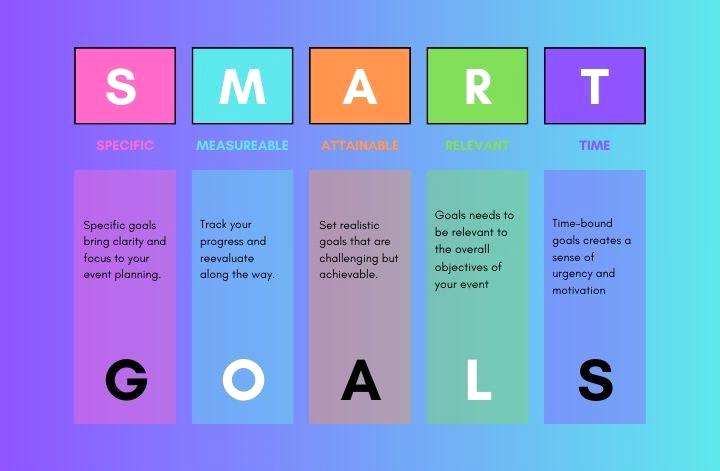At a Glance:
- SMART goals provide clarity and focus on event planning.
- Measurable goals promote accountability and keep the team motivated.
- SMART goals enhance efficiency and ensure events align with broader objectives, leading to success.
Setting SMART goals is a powerful strategy that can make planning a successful event much more manageable and effective.
Whatever kind of event you’re planning—a small business get-together or a big conference—SMART goals can help it go smoothly and achieve its objectives.
In this post, we’ll discuss why SMART goals are crucial and how they can enhance event planning efforts.
Why Clear Goals are Important?
One of the best things about SMART goals is that they help you stay focused. By setting clear goals, you can be specific about what you want to achieve with your event.
This level of detail aids in developing a focused plan and makes it easier to share your vision with your team and stakeholders.
Here’s why every event planner should focus on smart goals if they are to ensure the grand success of the event.
Clarity and Focus
Specific goals bring clarity and focus to your event planning. They allow you to pinpoint exactly what needs to be done and allocate resources more effectively.
For example, if your goal is to boost social media interaction, you can focus on strategies like live-tweeting, creating event hashtags, and encouraging attendees to share their experiences online.
This targeted approach increases the likelihood of achieving your desired outcomes.
Improved Planning with Measurable Goals
When you set measurable goals, you establish clear criteria for success.
For instance, you might aim to attract 500 attendees or achieve a 90% satisfaction rate in post-event surveys.
By tracking these metrics, you can make data-driven decisions to improve future events.
Accountability
Measurable goals also enhance accountability. When you have specific targets to meet, it becomes easier to hold yourself and your team accountable for their roles in the event planning process.
Reviewing progress against these goals regularly ensures that everyone stays on track. In addition, if any issues persist, they are addressed promptly.
Achievable Goals for Realistic Expectations
Setting achievable goals is essential to maintaining motivation and ensuring realistic expectations. While it’s important to aim high, setting unattainable goals can lead to frustration and disappointment.
By setting achievable goals, you create a sense of accomplishment and keep your team motivated throughout the planning process.
Resource Management
Achievable goals also help with resource management. When you have a clear understanding of what is realistically possible, you can allocate your budget, time, and manpower more effectively. This prevents overextension and ensures that all aspects of your event receive the attention they need.
Relevance for Aligning with Objectives
Goals should always be relevant to the overall objectives of your event. Relevant goals ensure that your efforts are aligned with your organisation’s broader mission and vision.
For example, if your corporate event management company aims to enhance brand awareness, setting goals related to increasing media coverage or attendee engagement would be highly relevant.
Priority Setting
Relevance also aids in priority setting. By focusing on goals that align with your key objectives, you can prioritise tasks that will have the most significant impact on your event’s success.
This helps in efficiently managing time and resources, ensuring that the most critical aspects of your event receive the attention they deserve.
Time-Bound Goals for Urgency and Motivation
Finally, setting time-bound goals creates a sense of urgency and motivation. When goals have a clear deadline, they encourage prompt action and keep your planning process on schedule.
Time-bound goals also allow you to set milestones and celebrate small victories along the way, maintaining momentum and motivation.
Milestone Setting
Milestones are an integral part of time-bound goals. They break down the planning process into manageable chunks and provide opportunities to assess progress and make necessary adjustments.
Celebrating these milestones boosts morale and keeps everyone engaged in the planning process.
In conclusion, incorporating SMART goals into your event planning can significantly enhance the clarity, focus, and overall success of your events.
By being specific, measurable, achievable, relevant, and time-bound, SMART goals help you create a strategic roadmap that leads to successful and impactful events.
Therefore, working with a corporate event management company and adopting SMART goals is a smart move to ensure event success.








